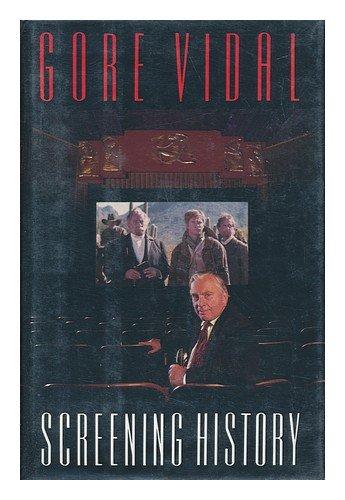Writing on Air:
Gore Vidal’s
Screening History

“As I now move, graciously, I hope, towards the door marked Exit, it occurs to me that the only thing I ever really liked to do was go to the movies. Naturally, Sex and Art always took precedence over the cinema. Unfortunately, neither ever proved to be as dependable as the filtering of present light through that moving strip of celluloid which projects past images and voices onto a screen. Thus, in a seemingly simple process, screening history.”
I know what you mean, old friend. And you did indeed pass through that Exit door – very graciously, it must be said – four years ago this month. You now know whether or not you were correct in your lifelong atheism. If you were correct then of course you now know nothing at all; if you were wrong and there was something waiting for you on the other side of the grey door then I assume that you reacted with your customary dry wit.
And as I begin that not-so long wait to follow you and…well, in my case to probably shuffle UNgraciously towards the Exit, it also occurs to me that the only thing I ever really liked to do was go to the movies.
Screening History is considerably dated in many respects, although it only appeared in 1992. Indeed, this slim little volume (under 100 pages) points unconsciously to how quickly things are speeding up as – who knows — perhaps our entire civilization (such as it is) is moving towards the door marked Exit?
If so, it is doing it with almost no grace whatsoever.
Although Vidal is writing about an earlier time – he was born in 1925 – he shares my own nostalgia for a way of watching movies that no future generations are ever likely to know.
The Two Mr. Karloffs
When I was discovering cinema in the late 60s and early 70s, the fact was that if we saw a film once then the chances of seeing that film again in the near future were slim. In fact, at that point a film had to have finished screening in the cinema at least five years before it could appear on television – and usually much longer.
So when my generation, as with Vidal’s previously, viewed a movie then it was with complete concentration. There were no tapes or DVDs, no downloads or recording equipment.
I think that it led to a talent for pure recall that this current crop of spoiled little brats simply don’t have. Because, of course, they don’t need to have it. Everything is instant – and if they miss something, well…there will be something else along in a minute.
But they’ll never know the excitement of sitting down to see a much-anticipated film or the pure joy in that wonderful moment when the curtains (anyone remember them?) in front of the big screen opened – and we were transported to a world beyond our imagining.
I took a little satisfaction in the fact that one of Mr. Vidal’s most important film experiences was the 1932 The Mummy, just as mine was the 1931 Frankenstein, both starring the great Boris Karloff:
“Fifty-eight years later, I watched the movie for the first time since its release and I became, suddenly, seven years old again, mouth ajar, as I inhabited, simultaneously, both ancient Egypt and pre-imperial Washington DC. Then, as the film ended, my seven-year-old world dissolved, to be glimpsed no more except for the odd background shot of a city street, say, in a 1932 movie, where now-dead people are very much alive, unconscious of the screening camera as they go about their business, in the margins of a film where they are forever, briefly, alive.”
If you should come across a copy of this little gem, then I would advise that it will only be of interest if you are familiar with Gore Vidal’s essays. Even better is if you are familiar with that slightly self-satisfied, sometimes sarcastic, often caustic and always wonderful voice of his. For that voice permeates these pages. It strongly mixes his political, childhood and movie memories with typically bitchy asides and is rather what I imagine it would have been like to hear him holding forth at some gossipy Washington party.
I doubt, though, that it is for those new to him.
_______________________
There is a quite large and interesting selection of photos here, including a startling one of an incredibly young William Shatner playing Vidal’s grandfather, the blind Senator T.P. Gore:
“Between 1954 and 1960 I wrote a number of plays for television. These one-hour plays were performed live, and most of the country watched them. Then live drama was eliminated altogether in favour of quiz shows. My last play was The Indestructible Mr. Gore, with William Shatner as my twenty-five-year-old grandfather-to-be and Inger Stevens as his wife-to-be. I acted as narrator, from the future, wandering in and out of scenes. The play went on air December 13, 1959. Everyone seemed to enjoy it, including my dying grandmother. As usual, no kinescope has survived. We wrote, literally, on air.
Screening History by Gore Vidal
Harvard University Press 1992

Recent Comments